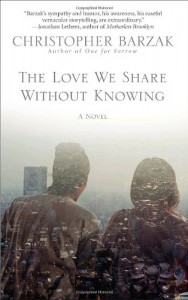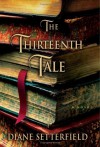The Love We Share Without Knowing

Dear God, what a depressing book. I mean, it was lovely, but just kick me in the gut a couple of times or something because OW.
The Love We Share Without Knowing is not technically a novel, although it's been classified as one by some sort of consensus that I was not a part of. The book is comprised of a series of interconnected stories, all with different narrators, different writing styles, and different types of POV. I suppose it's technically a novel because each story does depend on all the others if you're going to get the full effect, but in theory you could just plop yourself right into the middle of any story in the book and have a grand ole time. Barzak doesn't spoon-feed you the connections, either. You kind of have to work for it, and the central theme (hint: it's the title of the book) really does tie it all together.
The Love We Share Without Knowing follows a cast of characters in and around Ami and Tokyo, Japan -- characters that are both American and Japanese -- as they work through whatever it is they have to work through. But weird, slightly supernatural stuff happens in each story: a young man is seen by a blind man on a train, another is convinced he's being held in a coma by the lover who refuses to let him go, a young American boy meets a Japanese girl dressed like a fox and it changes his life, and a girl named Love reads a single line in the diary of a love hotel. It doesn't sound like much, but it's woven together beautifully.
Usually this type of "serious" fiction doesn't appeal to me -- lots of deep character introspection, not a lot of plot or joyful resolution, and a sense that the author is very smart and knows it -- but the slightly weird quality of some of the stories managed to come across in the blurb on the back of the book, and hey, it was nominated for a Nebula in 2009, which always gets my attention.
I liked this book a lot. I liked the emphasis on Japanese culture (and the ways it intersects with American culture). I liked the way the weird and fantastical elements of the story mingled with what was essentially a literary sensibility -- that willingness to embrace genre takes away a lot of the big-headedness of the thing. I liked most of the characters, and a few of the stories were downright beautiful. And it's all tied together with clean prose that is never over the top.
It's a sad book with a sad message, but the sadness feels real and not indulgent. In an alternate universe there's probably a me who would give this book five stars, but I don't ever see myself re-reading it. (Maybe a few of the stories, but never the whole thing.)




